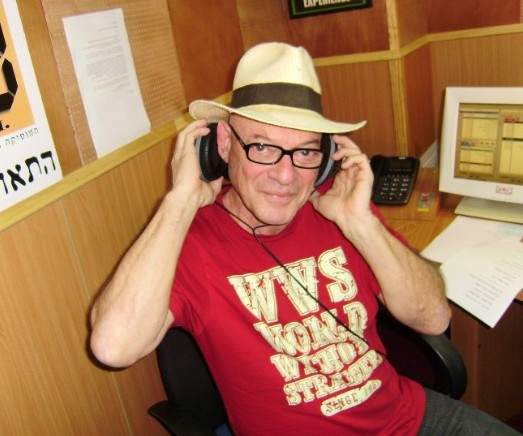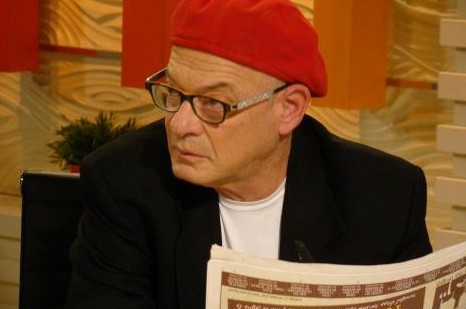Dori Ben Ze'ev: "What Keeps You Alive and Gives You the Strength to Fulfill Your Unique Mission in the World – Is Humility. There Is Nothing Else."
Actor, singer, broadcaster, lyricist, and teacher Dori Ben Ze'ev shares an open-hearted conversation about his years of extensive and unique creativity. The friendship with Meir Ariel and the album in his memory, life's lessons in humility learned on stage, and his special connection with the world of prayer. A personal interview.

"Leaving everything, sailing to the sea / going out of oneself, going out to the world / changing his life, also changing his name / and always the stage – it is his whole world / then a wife and a small child / and hard, how hard are the lives of an actor / 'Habima', 'Cameri', 'Sambatyon' / and life, and eating, and breathing – theater" (from the song 'His Whole World'. Written by: Hamutal Ben Ze'ev. Composed by: Dori Ben Ze'ev)
Eladory, or as he is more commonly known, Dori Ben Ze'ev, is not just another creator. He has a rich record of activity – from presenting programs on Galatz, to writing songs, singing, acting, and even teaching. In fact, he is one of the more interesting creators in the Israeli cultural world – but if we seek to define his multi-faceted and layered personality – we must know this: Dori is not a person to be put into definitions and paradigms (templates).
Throughout the interview, I was surprised to discover that behind this great figure, whose songs have already conquered so many stages and hearts – stands a truly humble and modest person. Unlike many others in his field, Dori regards his profession as a mission he has been gifted, a mission he must justify, between himself and his conscience, day by day. "In a profession like ours, the greatest thing is to remember to be in a position of humility. It's not easy, and it requires intensive personal work, but without it, it's impossible. We are all made of the same material, and we all suffer from ego to a certain degree, but you have to work on it.
"You come to the stage, people applaud you, praise you, and glorify your name – in such a situation, it is very easy to develop peacock feathers and walk around with a feeling of 'my strength and the power of my hand achieved this success.' Unless you work on yourself. And I can testify about myself, since I understood it – I do not stop working on it. When you understand that you are an integral part of something important called humanity, what keeps you alive and gives you the strength to fulfill your unique mission in the world – is humility. There is nothing else. After a lot of trial and error, I realized this is one of the most significant things for me, and it works wonders when I manage to apply it".
 A broadcaster at the top of his game. Dori Ben Ze'ev
A broadcaster at the top of his game. Dori Ben Ze'ev
And what happens if, Heaven forbid, he forgets? "I immediately receive a sign," Ben Ze'ev says. According to him, in teaching, for example, one sees it very well. "When I enter the classroom, I have a choice. I can be the teacher who shows the students how smart, understanding, and knowledgeable he is. Then they are amazed and say, 'How cool is this Dori', 'How smart', and so on. But what really interests me? That they feel 'Wow, how many new things I learned today'. I was fortunate to be the messenger for that? How great. But my personality or that of any other teacher should not come at the expense of the student's space. This is an art that must always be learned, how to make room for the other, without losing my natural space".
The Close Friendship with Meir Ariel (z"l) and the Album Made in His Memory: "Modeh Ani"
When talking about Dori Ben Ze'ev, it seems impossible not to talk about the special connection forged between him and his good friend – singer Meir Ariel (z"l), about whom Ben Ze'ev stated that he was "a true soul friend." It was a connection that began many years ago and grew stronger within the framework of a weekly Bible study group in which the two participated. "In many ways – the connection between Meir and me stemmed from the place of using language and words, and from the love for the written word and the meaning it holds within. In Torah study sessions, Meir was revealed to be a wise student and a true conversationalist. Every day he would open a book, learn, and enrich himself and us. As the son of a Bible teacher, there is no doubt that I found in him a soul mate, even in this aspect".
After his death, you were involved in arranging and composing an album called "Modeh Ani" in Meir's memory. What was the trigger for creating the album in this way, and how did this endeavor help you cope with the memory of his existence?
"There is no doubt that Meir's death caused me a very serious shock," he says with a downcast face. "In fact, to this day, it is difficult for me to believe that he is no longer with us. His absence is felt in my life every day. The album was born out of our need, his close friends – Shalom Hanoch, Moshe Levi, myself, and others – to mourn. We were looking for a way to commemorate our good memories of him, and to come to terms with the difficult place of mourning.
"We took the material from various tapes that Meir left in his drawer. These are bits and pieces of songs written by Meir, that had not yet been recorded. Initially, it felt like an impossible task to bring such a project to life, as the raw material was very basic. We spent long hours in the studio to produce something beautiful from this raw material that Meir left behind. We delighted in every text, breathed every word into our being, and there is no song that did not receive the depth it deserved. Looking back, I think we did a good job. We managed to deal with the difficult challenge in a creative way and express our appreciation for Meir (z"l), and what he symbolizes to us."
 Dori performing at a special evening in memory of Meir Ariel (z
Dori performing at a special evening in memory of Meir Ariel (zLet's talk about your family. You have three siblings – Hamutal, you, and Eran, and in a non-coincidental manner – you all chose to continue your parents' path, to some degree: writing, acting, singing... Was the direction always clear, or were there thoughts about other directions like medicine or law, for example?
"There is no doubt that growing up in an atmosphere of theater and music, art, and education – shaped our personalities in one way or another. However, I believe it very much depends on a person's character: each of us could have chosen and been capable of doing anything – but the love for the stage is a kind of virus, that stuck to all of us. It's not for nothing that someone said your profession chooses you. For me, the use of a rich and ornate language alongside a fertile imagination – started at a very young age. I always loved diving into the depths of meanings and playing with words. For example, when I first saw a picture of Moshe Dayan, the then Chief of Staff, I immediately said 'here is Moshe Dayan without the evil eye'. I was eight or nine years old then".
On His Connection with Hamutal: "I Found a Wonderful Ally"
There are families where the return to religious observance of one or more family members serves as a magnet for the whole house. In some cases, the topic even leads to conflicts and antagonism. It happens even in the best of families, but not so in the Ben Ze'ev family. There, respect for others' way of life – their choices and opinions – is a paramount value. Hence, it is no wonder that regarding the connection between him and his sister, Hamutal – poetess, lyricist, and playwright par excellence, who strengthened her spirituality together with her husband about 20 years ago, Ben Ze'ev says, "I fully respect the way of life Hamutal and her husband have chosen. We continue to perform joint plays, continue to work together so that even if there are certain points of view that have changed for her, it does not manifest in our joint work." Ben Ze'ev smiles and adds, "I have always found in Hamutal a wonderful ally – this hasn't changed with her return to religious observance and it won't change. Each of us thinks about and feels the other, and knows exactly where to draw the thin line between mutual respect and excessive involvement in others' lives. That's how we were raised and educated, and that's what we know."

Few know this, but Ben Ze'ev's spiritual search began well before his sister Hamutal's return to religious observance began to take shape. Together with his friends Mordechai (Popik) Arnon, Rabbi Uri Zohar, and others, Ben Ze'ev participated in various Torah study groups and workshops, aiming to trace his true self. You'd be surprised to hear that observing Shabbat was part of this experience. "The reason I was there is that I wanted to taste the flavor of spirituality. I approached the study with the thought that I could connect to it. I quickly realized that the framework and my ability to maintain Shabbat observance over time simply don't suit me. However, I possess the quality of inclusion and respect for anyone who has chosen this path, and maybe this experience made me more tolerant towards the internal processes Hamutal and her husband underwent when they began observing the Torah and commandments".
And how is this tolerance manifested in relation to Judaism?
"There are several parameters to it. As a Jew, I do not feel I live separately from my Judaism. Judaism is always within me, whether I want it or not. Whether I think about it or not. So what? Into it, I integrate elements that are unique to me. If I meet religious people, I have a very unique approach to them, and it is often accompanied by a feeling of appreciation. Why do I appreciate them? Because they have chosen a path of deep and intensive study from the sources. A person who chooses to immerse themselves in studying – is accepted by me in every sense" (laughs).
"Suddenly You Understand That You Were Saved, You Received a Lifeline"
In the beginning, Ben Ze'ev's attitude towards the profession was a type of personal fulfillment, and nothing more. "I wanted to express what was happening inside me and to be who I am. The stance I was in then wasn't broad enough to understand that what I was doing on stage in front of the public was actually a mission. When I internalized this insight, years later, the sense of mission intensified and became the knowledge that I am not only redeeming myself but also others. It's a wonderful feeling to know that the things you do bring joy to others, and I am grateful for it with all my heart".
Speaking of gratitude – how, in your opinion, should one correctly express thanks, and for what exactly?
"This whole area of humility, which I mentioned earlier, is a place of gratitude. You need to understand that everything that happens to you, happens to remind you of the simple, humble, and sensitive place of recognizing the good. Say thank you, even if that thank you seems irrelevant at a certain moment.
"Sometimes, you are taken out of a certain framework you were in, and you hold your head and ask, 'How do they do this to me? How did I lose this thing/person/place?' You genuinely try to understand what was here and what caused this hole to open in your life. And this can throw you off your balance. But after some time of wallowing in the pain, in the question marks, in this uncertainty – suddenly you understand that you were saved, you received a lifeline. And this kindness that suddenly reveals itself before your eyes awakens you to say thank you".
Once and for all – who is Hashem to you?
"Hashem is hope, a connection to the unknown part of you that is broader than the sea. Hashem is... he's many things. There isn't one thing I can tell you about him because Hashem is present in all and fills everything, and each time – you grasp him from a different perspective. If you are in the heart of a storm, your ship threatens to swallow you into the depths and from this place you call to your God – it immediately connects you to yourself, to your strengths and weaknesses. From such a cognitive place, the connection to him is possible in every situation in your life. How? Through prayer. Prayer paves the way for you to unite with Hashem, and there isn't anyone who can't pray. Every person in this world, in any cognitive place they might be – can speak to him. Everyone, according to their own tools and understanding, can and should talk to him and thank him."

